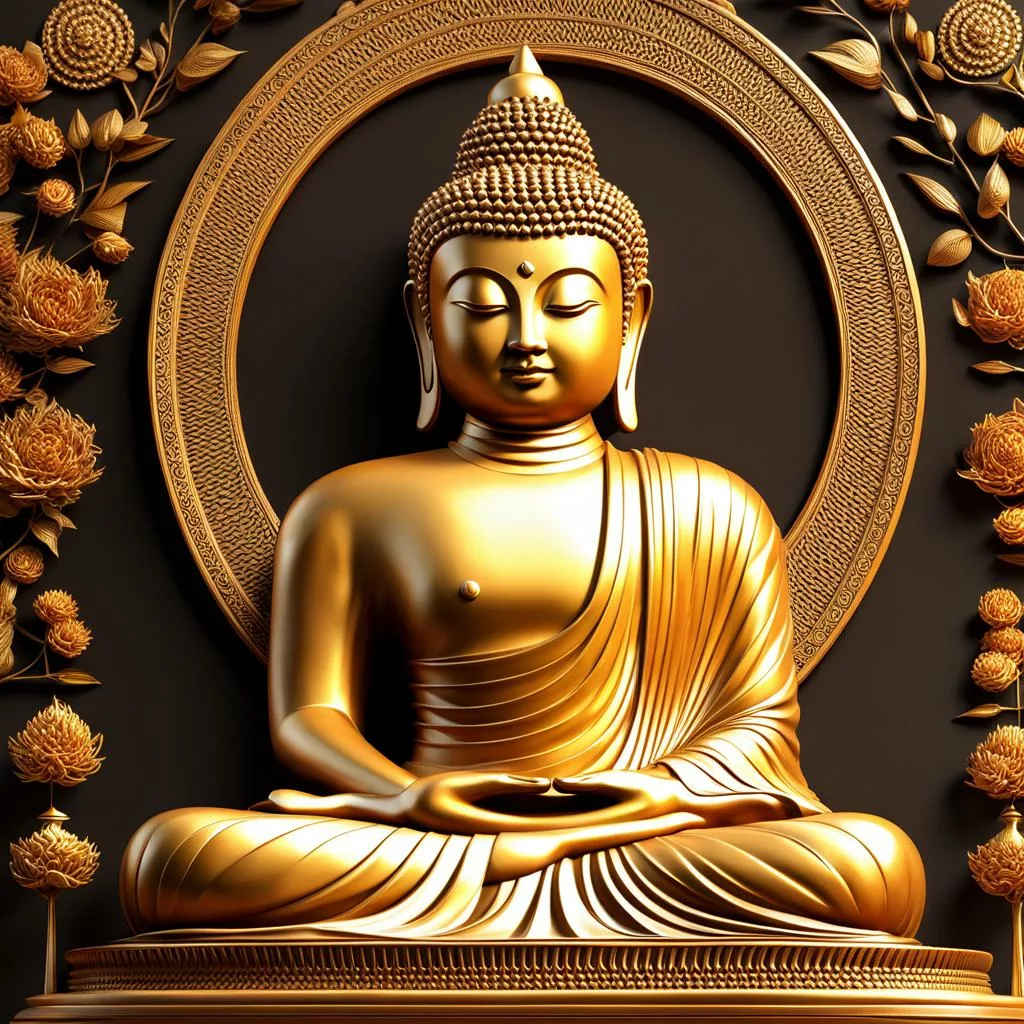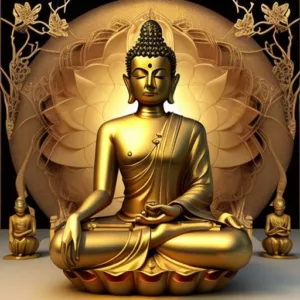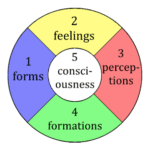
Is Buddhism a religion, based on the generally accepted definition of a religion? Yes. The debate arises because the philosophy is doctrinaire and non-dogmatic by definition.
The Soteriology of Buddhism is liberation from suffering and enlightenment to reality. The eschatology is endless rebirth unless proper view and meditation are applied.
A second question arises around Buddhism is a religion because Buddhism has no ‘gods,’ per se. Although Buddha acknowledged such beings as Indra, Brahma, and Shiva, he claimed they were essentially long-lived, non-embodied entities, not gods in the eternalist sense.
I find Buddhism to be definitively religious and I have no problem with that. The philosophical aspects are essential and should be studied to the appropriate extent. That depends on the person. The philosophy is more essential to the View of Buddhism. That is to say, what is reality? I study the doctrine, then contemplate it, then apply it to my experience, asking if it matches up?
However, some parts of the View are beyond our ability to perceive. For me, I’ve seen enough of Buddhism to be true, but unsaid in other religions. I therefore, have some measure of faith that the more esoteric aspects of the doctrine are valid. For me, Buddhism is a religion.
At this point, religion becomes my go-to. The ritual components create more favorable conditions for meditation to do its work. Proper vipashyana meditation can, and should, change the View for the better, helping a person to see reality more directly. Then philosophy can provide confirmation and refinement of what has been experienced via the ritualistic, and religious application of meditation.
Secrets of Meditation for Anxiety
Like millions of people, you may have suffered from anxiety for years. Meditation, yoga, peaceful music – it never works. It takes too long, and it’s not stable. Why? Because peace is treated as a cause for freedom, but it’s not – it’s the result. The cause to free yourself from anxiety is completely different.
Click now to Overcome Anxiety for good.
Table of Contents
Is Buddhism a Religion or a Philosophy?
Buddhism is both religion and philosophy. One cannot exist without the other. Generally, many religions have such a pared-down philosophy (at least as presented to the laity), that it seems there is no philosophy. But all religions have a philosophy.
Example: There is only one god. (monotheism). Jesus was the son of god to save us from the consequences of our sins (Christian sects). The ultimate Self of Atman is the ultimate attainment and goal (Hinduism).
Frequently, the religious aspects overwhelm the extremely limited philosophical aspects. In Eastern Buddhism, the same thing happens. Many of the laity in Buddhist countries believe Buddha is a god. But that is never said in doctrinal Buddhism.
In Buddhism, the triad of Hearing, Contemplating, and Meditating is very central to any attainment on the path. We must first hear (or study) the dharma. Then we contemplate and discuss it to gain conceptual understanding. That’s the philosophical aspect. Afterwards, we meditate on it to gain direct understanding. An astonishing number of ritual aspects can be done to aid in this. These are religious in nature. They specifically increase faith, longing, reverence, commitment and so forth. Dharma is prioritized over secular concerns. These are religious characteristics.
How to meditate like a yogi
and enter profound samadhi
What is a Religion?
To analyze the question: Is buddhism a religion, we need to ask what a religion is. Religion is a complex and multifaceted concept, but at its core, it’s a system of beliefs and practices that relate humanity to spirituality and, often, a higher power. Here are some key characteristics that are commonly found in most religions:
- Belief in a Higher Power: This is a defining feature for many religions, though the nature of this higher power can vary greatly. It could be a single God, multiple deities, or a universal force or spirit.
- Sacred Texts: Religions often have scriptures or sacred texts that are considered divinely inspired or authoritative guides for living. These texts can lay out the religion’s history, beliefs, practices, and moral code. Examples include the Bible in Christianity, the Quran in Islam, and the Vedas in Hinduism.
- Rituals and Practices: Rituals are specific actions or ceremonies performed to express devotion, connect with the divine, or celebrate important events. Practices can encompass daily prayers, meditation, pilgrimage, or specific rituals for life passages like birth, marriage, and death.
- Moral Code: Most religions have a set of ethical principles or moral code that guides behavior and promotes a virtuous life. These principles often emphasize values like compassion, honesty, and respect.
- Community: Religion often fosters a sense of community among believers. This can be through shared worship services, belonging to a religious institution, or simply feeling connected to others who share your faith.



Essential Buddhism is a Religion and a Philosophy
Buddhism, while often classified as a religion, offers a unique set of beliefs and practices centered around achieving enlightenment, a state of complete freedom from suffering. Here are some key aspects that differentiate Buddhism from many traditional religions:
- The Four Noble Truths: This core teaching lays out the reality of human existence: life is inherently filled with suffering (dukkha), caused by clinging to desires and aversions. The truth offers liberation from this suffering through the Eightfold Path.
- The Eightfold Path: This is a practical guide for achieving liberation, outlining a path with eight steps: Right View, Right Thought, Right Speech, Right Action, Right Livelihood, Right Effort, Right Mindfulness, and Right Concentration. By cultivating these qualities, one can break free from the cycle of suffering.
- Enlightenment: The ultimate goal in Buddhism is to achieve enlightenment (nirvana), a state of perfect peace, wisdom, and liberation from suffering and the cycle of rebirth.
One of the striking features of Buddhism, particularly in Theravada traditions, is the absence of a central deity. Unlike many religions, there is no all-powerful God who controls human destiny. The focus is on individual effort and self-reliance in following the path to liberation. The Buddha, Siddhartha Gautama, is seen as a teacher who achieved enlightenment and showed the way for others, but not as a divine being to be worshipped.
Is Buddhism a Religion by its Characteristics
Despite the absence of a central deity, some Buddhist practices share characteristics found in many religions:
- Meditation: Meditation is a core practice in Buddhism, used to cultivate mindfulness, focus, and inner peace. While meditation can be practiced for various purposes, in Buddhism, it serves as a tool for achieving enlightenment.
- Ethical Conduct: Buddhism emphasizes ethical conduct through the Five Precepts: avoiding harming living things, taking what is not given, sexual misconduct, harsh speech, and intoxication. These principles guide moral behavior and contribute to a peaceful and harmonious life.
- Monastic Life: Monasteries play a significant role in some Buddhist traditions. Monks and nuns dedicate their lives to studying, practicing, and teaching the Dharma (Buddhist teachings). Monastic life provides a structured environment conducive to spiritual development.
It’s important to note that Buddhism is a diverse tradition with different schools and practices. Some Mahayana traditions, particularly in East Asia, incorporate aspects of deity reverence. These traditions may revere Buddhas and Bodhisattvas (enlightened beings who choose to remain in the cycle of rebirth to help others) as objects of devotion and inspiration.
This analysis shows that Buddhism is a religion.
Perspectives on the Debate: Buddhism is a Religion vs. a Philosophy
The question of whether Buddhism is a religion or a philosophy has been a topic of discussion for centuries. Here’s a glimpse into both sides of the debate:
Buddhism as a Religion:
- Supporters point to the presence of core religious characteristics like ethical codes, meditation practices as a form of worship, and monastic communities.
- The focus on achieving enlightenment, a transcendent state, aligns with the religious pursuit of ultimate liberation or salvation.
- The reverence for Buddhas and Bodhisattvas in some traditions resembles the veneration of deities in other religions.
Buddhism as a Philosophy:
- Opponents highlight the absence of a central deity and the emphasis on self-reliance as contrasting religious norms.
- The Eightfold Path is seen as a practical guide for living a meaningful life, similar to philosophical schools of thought.
- The focus on personal liberation through self-awareness and ethical conduct aligns more with philosophical inquiry than religious dogma.
Ultimately, the categorization depends on how you define “religion” and “philosophy.” Buddhism may occupy a unique space that encompasses elements of both. It offers a comprehensive understanding of the human condition, practical tools for self-improvement, and a path to a transformative state of being. Whether you consider it a religion, a philosophy, or a way of life, Buddhism’s core teachings offer valuable guidance for navigating the complexities of life.
Secular Buddhism: A Modern Approach
Within the diverse landscape of Buddhism, a movement known as Secular Buddhism has emerged. This approach emphasizes the pragmatic and ethical aspects of the Buddha’s teachings, stripping away the supernatural elements found in traditional forms. Secular Buddhists view the Buddha as a wise teacher rather than a divine figure, and focus on applying his insights to cultivate a more mindful and compassionate existence in this present life. Meditation practices and ethical principles like the Five Precepts become tools for personal growth and societal well-being, rather than steps on a path to enlightenment or rebirth. Secular Buddhism offers a way for those with a more skeptical worldview to engage with Buddhist wisdom and find practical methods for reducing suffering and living a meaningful life.
A Traditional Buddhist Perspective on Secular Buddhism
Secular Buddhism’s emphasis on the pragmatic and ethical aspects of the Buddha’s teachings has found resonance with many in the modern world. However, from a traditional Buddhist perspective, there are some key areas of critique:
- Loss of Depth and Motivation: Traditional Buddhists believe the core teachings, including the Four Noble Truths and the concept of suffering (dukkha), provide a deeper understanding of the human condition. Secular Buddhism, by downplaying these aspects, might offer less motivation for sustained practice on the long path to liberation.
- Devaluing Rebirth and Karma: The concept of rebirth and karma is a fundamental tenet in traditional Buddhism. It provides a framework for understanding the consequences of actions and the cyclical nature of suffering. Secular Buddhism’s rejection of these ideas can lessen the sense of personal responsibility for creating a better future across lifetimes.
- Dharma for Daily Life vs. Ultimate Goal: While traditional Buddhism acknowledges the benefits of applying Buddhist principles to daily life, the ultimate goal remains achieving enlightenment and liberation from suffering altogether. Secular Buddhism’s focus solely on improving daily life risks neglecting the transformative potential of the full Buddhist path.
- The Role of Rituals and Community: Traditional Buddhist practices include rituals, chanting, and devotion to Buddhas and Bodhisattvas. These elements are seen as creating a supportive environment for spiritual development and fostering a sense of community. Secular Buddhism’s emphasis on a purely rational approach might overlook the value these practices hold for many.
It’s important to remember that Buddhism has always adapted to different cultures and times. Secular Buddhism can be seen as a contemporary expression of the Dharma, making it accessible to a wider audience. However, traditional Buddhists would argue that a complete understanding and the full benefits of the path can only be achieved by embracing its core spiritual principles alongside the practical aspects.

May all beings be happy
May all beings be peaceful
May all beings be safe
May all beings awaken to the light of their true nature
May all beings be free







